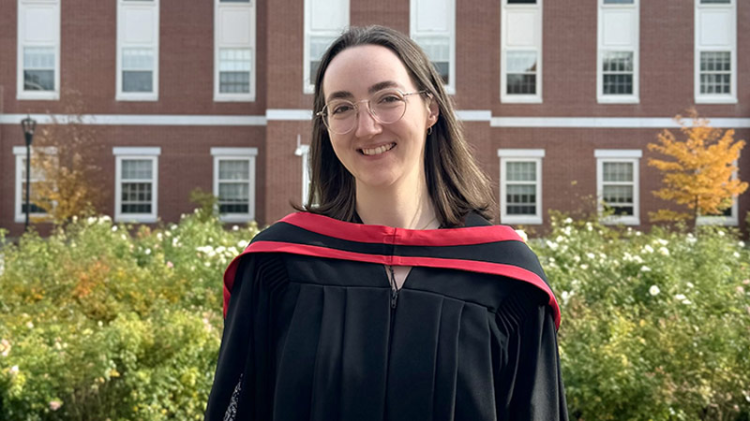Claire Anderson (BSc'21, MSc 24) has loved science and math since childhood.
"I enjoyed it growing up. Those were my best courses in school," she remembered.
"Going into university, I knew I would end up in chemistry or biology. My parents, Brent Anderson (BScCE'84, MScCE'86) and Kimberley (Holmes) Anderson (BScCE'87), were University of New Brunswick (UNB) engineering graduates and influenced me toward science.

"Others from my family also went to UNB for engineering, so maybe it is a bit surprising I ended up in chemistry instead!"
Anderson's decision to pursue chemistry at UNB has proven sound. In June, she will receive the CCUCC Chemistry Master of Science Award, which recognizes outstanding achievement and potential in research by an MSc graduate student.
"I felt proud when I learned that I will be given the award," she said. "It means a lot that the work I've done over the last three years is being recognized outside my personal life and UNB."
The award recognizes Anderson's research on a promising potential solution for energy storage using non-aqueous redox flow batteries.
Redox flow batteries, Anderson explained, can be used to store wind- and solar-generated energy.
"They are important for energy storage on a grand scale," she said.
"My research focused on computational chemistry. There are experimentalists at UNB who are researching redox flow batteries. I was helping them by using computations to look at different molecules that might be useful in these batteries."
Computational chemistry, in her case, involved computer modelling and calculations on different molecules.
With too many molecules to look at each possibility, Anderson used an algorithm that made predictions by learning patterns in the data.
"I generated a code that could take all the structural characteristics, sort through them and generate a big set of different molecules that could be used in redox batteries," said Anderson.
"You could see how the population [of potential molecules] was improving, almost in real time. There were some challenges ... we had to determine the fastest and most efficient way to get the results. Many things had to be reworked, but eventually, I figured out something that worked."
Dr. John J. Neville, associate professor and chair of the department of chemistry at UNB, expressed his pride in supporting Anderson's nomination for the award.
"Claire is certainly a worthy recipient," he said. "This approach has the potential to substantially accelerate the development of new energy storage technologies," Neville noted, emphasizing its broad societal and environmental implications.
Neville praised Anderson's technical excellence and originality, highlighting her innovative design of a molecular representation tailored to machine learning. He commended her collaboration with experimental chemists to create viable screening criteria for automated molecular discovery, which required strong coding skills and adaptability.
Beyond the immediate impact on redox flow batteries and energy storage, Neville said that Anderson's pioneering use of generative models and genetic algorithms in her thesis could influence fields like drug discovery.
"It is exceptional that an MSc thesis has the potential to set the stage for years to come," he said, predicting that AI-driven chemical discovery will continue to grow.
Dr. Stijn De Baerdemacker, associate professor of chemistry and Anderson's graduate supervisor, also emphasized the groundbreaking nature of her work.
"Claire's research has indeed been one of the first (if not the first) explorations of genetic algorithms a type of algorithm that uses survival of the fittest' to find an optimal candidate in redox flow battery research," he said.
He also credited her undergraduate experience in computational chemistry in supporting her remarkable achievement. Anderson's results are currently being prepared for journal publication.
"Students exposed to diverse research experiences move on to do great things."












